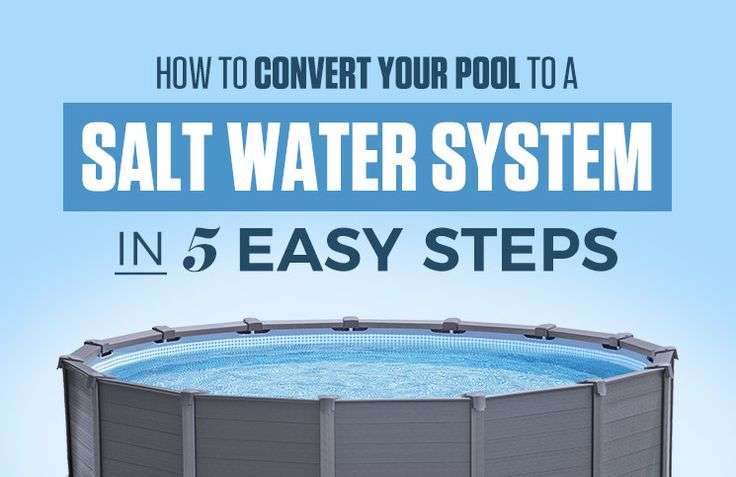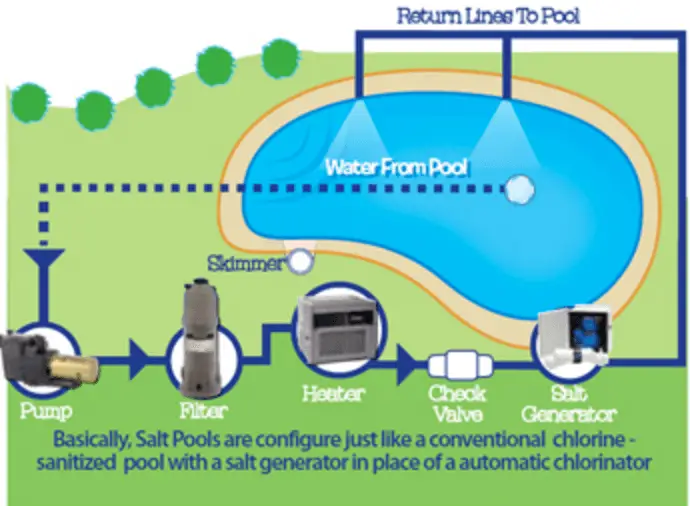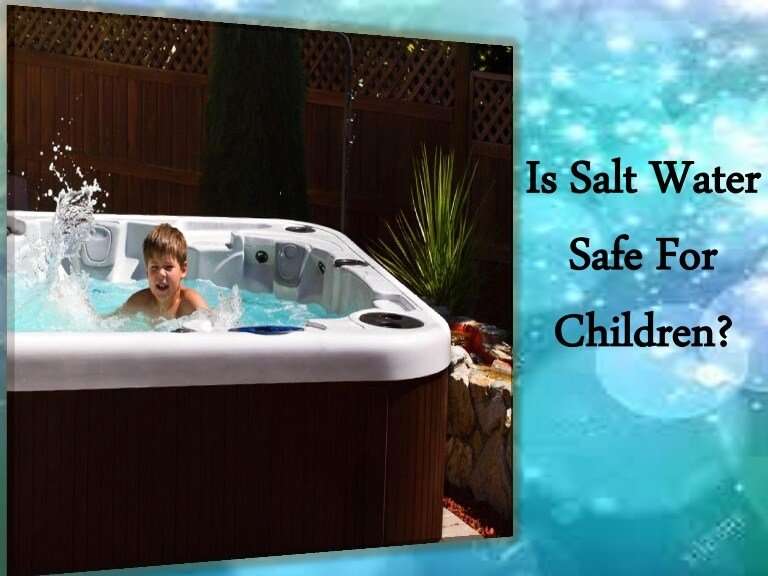Self Cleaning Salt Water Chlorinator
If you want to lower the amount of maintenance you do on your , consider investing in a self-cleaning system. Salt water pools have positively-charged calcium that lives in the water. The calcium is attracted to the negatively-charged electrode plates. A self cleaning salt water chlorinator uses reverse polarity to periodically change the charge of the electrodes to a positive charge, thus the calcium does not build as quickly. Although you will still need to clean the cells, the self cleaning chlorinator will eliminate much of the work. They cost between $500 and $2,000 on average.
How Salt Water Pools Are Easier On Your Hair Skin And Eyes
If you have a chlorinated pool, chances are high that your kids have picked up a few pairs of swimming googles over the years. Opening your eyes underwater in a chlorinated pool is painful after all, youre allowing chemicals to come into contact with some of the most sensitive tissue in your body. Salt water is saline, and saline is the main ingredient in eyedrops and contact solution. Salt water pools are a lot gentler on your eyes, skin, and hair because theyre naturally biocompatible.
Salt Water Pool Test Kit
A salt water pool test kit costs about $15 to $55, and saltwater test strips cost $11 to $25 for 40. A test kit lets you know if you need to rebalance the salinity and pH level of your saltwater. To keep a healthy pool, the water should be tested once a week. Not all salt water pool test kits give results for the salinity of the water, so check to make sure the one you want to purchase gives that result.
Read Also: Half Mansard Screen Enclosure
Pool Maintenance Cost: Chlorine Vs Salt Water
One reason why everybody doesnt use salt water is that it costs more upfront. The initial cost of a salt-chlorine generator is usually between $1,700 and $2,500. They also only last around three to seven years before they need to be replaced.
The warmer the climate is where you live, the more chlorine your pool will need. This means the generator needs to work harder. So, those living in warm climates will likely be on the lower end of the replacement time-frame.
While they do cost a bit more on the front end than a chlorine set up, the ongoing maintenance for saltwater pools is typically far less expensive.
Generally, you can expect to pay somewhere around $300 to $800 a year on the chemicals youll need to maintain a chlorine pool. For a saltwater pool, you can expect the cost of chemicals and salt to run closer to $70 to $100 a year.
However, there are other expenses to consider.
Indoor Salt Water Pool

Although indoor salt water pools have many advantages, the cost to build one can be prohibitive. The pool itself costs about the same as other inground pools but the enclosure, as well as the need for a dehumidification system, will bring the total price to around $156,000-$200,000 for a 12 x 20 ft. pool.
Recommended Reading: Does Target Have Pool Supplies
How Much Does Everything Cost To Convert Your Pool To Saltwater
If you own a pool, theres no doubt youve heard about how great a salt water pool can be. You may be wondering how much it costs, and if its supposed to be so great, youre probably thinking it costs a lot. Luckily, it is a lot more budget friendly than you may think!;
But we can say that all day long- the best way to reassure you that you are making the best money moves for your wallet would be to show you! Were going to go through a few scenarios to help you get a good idea of how much it would initially cost.;
The basic conversion costs involved are…
the price of the saltwater chlorine generator
the cost of the actual salt to put in the water
installation costs
If you’re new to this, the most important thing to remember is that once you convert your pool, a salt system can save up to 40% or more over traditional pool chemical maintenance over its lifespan! A saltwater pool system eliminates the need to buy chlorine, shock, and algaecide, so it pays for itself pretty quickly and gives years and years of savings. Also remember, it’s not necessary to drain your pool or replace your other pool equipment in normal circumstances, and the whole start-up process usually takes about an hour.
How To Convert From A Fresh Water To A Salt Water Pool
The good news is, you dont necessarily have to drain your pool in order to convert it to salt water.;
However, if you use antibacterial agents in your pool, then draining it is a good idea. Antibacterial products are incompatible with salt chlorine generators, and make it difficult to keep the pool clean and balanced. You can remove these products by draining the pool, or by burning it out with a very high dose of chlorine, which can take several days.;
If/when your pool is free of antibacterial agents, you can begin to convert it to a salt water pool. Heres how:;
- Step 1: Test the water. Your pool should be tested and balanced to the specifications of your salt chlorine generator. Remember that balancing a pool takes time, and the pool should be balanced in this order:;
- Chlorine
- Hardness
- Metals
- When you adjust your pool, any changes you make tend to adjust all the other values, so doing it in this order allows you to save time. Once your pool is balanced, you are ready to proceed.;
You May Like: Can You Heat An Above Ground Pool
Preparing Your Pool For Conversion
We only need to balance our pool water in order to convert it for use with a salt water chlorinator! Contrary to urban legends, theres no need to drain and completely change out our pool water if we want to convert it. The first thing we need to do is to balance our pool water to the following levels:
- Free Chlorine: 1-3 PPM
Choosing A Salt Chlorine Generator
The salt chlorine generator is the largest investment you make in a salt water pool, so its important to choose the right one. Although theres no need to spend more money than you have to, an inadequate or low-quality generator wont work well or meet your needs in the long run. Here are some things to keep in mind when shopping for a salt chlorine generator:;
Recommended Reading: Head Lice Swimming Pools
S To Converting Your Pool To A Saltwater Pool
If you currently have chlorine, you may want to know how you would go about transitioning the pool from a chlorine to a saltwater system. Here are the basic steps:
1.;Choose your saltwater system.
There are essentially two considerations when you think about which;saltwater pool system;makes sense for you:
2. Decide if you will drain the pool.
You currently have water in your pool. You want to think about what to do with that water before you set up the chlorinator.
Should you drain your pool? It is actually unnecessary unless you are currently using;polyhexamethylene biguanide; in which case it is optional.;
Polyhexamethylene biguanide;is the active ingredient in an antibacterial pool sanitizer that is incompatible with chlorine. Your chemicals could be thrown out of balance in which case your chlorine may not be able to maintain cleanliness if you leave this chemical in the water.
3.;Embrace balance.
Salt is central to saltwater pool conversion, but you want to know other levels too. Typically chemical testing looks at calcium hardness, free chlorine, pH, and alkalinity. Healthy ranges for your pool water;are as follows:
Salt Water Chlorinators Vs Chlorine Pools Explained
Is there really a big difference in saltwater pools and chlorinated pools? Well, the answers might surprise you. In a nutshell, satwater pools are easily the best investment you can make for your home pool. A saltwater pool isn’t just dumping sacks of salt into your pool, it’s much more than that. We’ll go over the advantages of saltwater pools from traditional chlorinated pools, and why you should really consider converting your pool to one.
You May Like: Vitamin C Tablets For Pool Stains
Con: Power Usage And Wear
The flipside of saltwater is the power usage and wear and tear levels on your pool.;
Theres some debate as to whether saltwater is corrosive to your pool. Keep in mind, the salt levels in your pool are far below any naturally-occurring saltwater concentrations, so the corrosiveness of ocean water isnt an equal comparison.;
And while you will have to replace the shaft seal on your pool pump, this is a relatively easy and inexpensive fix.;
The bigger issue is power usage.;
Since saltwater acts as a continuous source for chlorine and the chlorine generator is constantly mining the saltwater to produce chlorine, the generator needs to stay turned on all the time.;
This can have a significant impact on your utility bills, especially in the summertime when your pool is in high demand.;
Converting Chlorinated Pools Into Saltwater Pools

Despite their many differences, chlorinated pools and saltwater pools actually have a lot in common. Namely, the actual pool itself . It is just thata poolregardless of whether it is saltwater or chlorine. Choosing a saltwater one over a chlorinated one doesnt mean you are limited to a certain size, depth or material. All you have to do is decide that you want a saltwater pool and then acquire the necessary equipment.
You can even convert an existing chlorinated pool into a saltwater pool, and it is a fairly easy conversion, says Crayton. All you really have to do is add a saltwater generator and you are set.
Is this DIY-able? For some, yes. But you will need to follow the manufacturers instructions closely. You also need to be very mindful of the fact that you are working with your homes exterior electrical system. This can be very dangerous, especially to inexperienced folks, so dont hesitate to call a pool professional for help with installation and set-up if you have any doubt about how to get your saltwater generator up and running safely.
Also Check: How To Get Out Of Contract With Blue World Pools
A Word Of Advice From An Experienced Pool Repair Man:
If a salt water pool has ten times as much salt as a traditional chlorine pool then this means that the rate of galvanic corrosion also increases ten times when you switch to salt water. Doesnt this sound like the kind of thing that someone should have mentioned to you when you asked about adding salt water to your pool? I sure think so, but even today you dont need to look very far to find a pool guy boasting all about how salt water pools are maintenance free or salt water is better than chlorine. Salt water is not better than chlorine. Salt water is chlorine.
How Do Saltwater Pools Work
How is this possible? Wont the swimming pool become a cesspool without a hefty dose of chlorine? No, because even though saltwater pools dont contain actual ocean water, they are set up to convert salt to chlorine by way of a component called a salt chlorine generator and a process called electrolysis.
So, your pool is still sufficiently chlorinated, but instead of using copious amounts of chlorine, it is getting it via the addition of salt alone, which is placed directly into the water. From there, the generator does the rest of the work, save for a tablet or two of chlorine youll need to toss in each week.
Will all of this salt make the pool feel too salty? According to Gary Crayton III, CEO of Pool Troopers, a pool maintenance and service company with locations in Florida, Arizona and Texasit will not. The amount of salt in saltwater pools is at a level equal to just 12% of the salt found in the ocean, he explains.
Recommended Reading: How Do You Get Iron Out Of Pool Water
Is A Saltwater Pool Easier To Maintain
YES! Theres no need to purchase, store and add chlorine to your pool. Simply add salt and maintain your levels and let the chlorinator do the rest.
Saltwater Pools are far more stable than chlorine pools. It requires less maintenance and fewer chemical testing and adding tasks . And of course less last-minute trips to the store to buy those chemicals if you run out.
What You Need To Know When Converting Your Chlorine Pool To Saltwater
Spring is just around the corner. And that means soon enough, it will be swimming season.;
As you turn to your pool cleaning tasks, you cant help but think that maybe your pool could do with a fresh start. Maybe one with a little less chlorine.;
But you also know that changing a chlorine pool to saltwater is a process, and you dont really know where to begin. Fortunately, were here to help. Keep reading for everything you need to know about saltwater pools and the process of converting your pool.;
You May Like: Does Chlorine Kill Lice
Average Salt Water Pool System Maintenance Costs
Expect to pay less than $100 per year for the salt and chemicals to maintain your salt water swimming pool. Compare this to $300 to $800 yearly for the chemicals to maintain a traditional chlorine pool. Homeowners should budget an additional $200 to $700 every 3 to 5 years to replace the salt cell. The electricity to run a salt water system will add $35 to $50 to your yearly power bill.
Saltwater Pool Vs Chlorine Pool
The main difference between a standard swimming pool and a Saltwater swimming pool is the Salt that is added to the water. Salt or Sodium Chloride dont sanitize the pool, chlorine still does. In order for the Chlorine Generator to make Chlorine and sanitize your swimming pool, the water in the pool must have a concentration of at least 3000 ppm or parts per million of Salt available.
If the pool doesnt have this concentration of salt, Electrolysis wont happen and the pool wont get Chlorine and you know what happens after that. The salt content or the salinity is minimal compared to seawater as you can see here, its a big difference.
Sea Water 35,000 parts per million Human Body 4,000 parts per million Saline Solution for contact lenses 6,000 parts per million
High Purity Food Grade fast-dissolving Salt is used in Pools. Most are all the same but use Salt that is granular, 99% pure, and non-iodized.
The recommended amount of salt to start from scratch for a 30k gallon inground swimming pool is around 20 bags-40lb. bags again this starts from scratch. Use a Salt Calculator like this one.This one is easy and can be used for your other chemicals like Cyanuric Acid that will also come into play with a Saltwater Pool.
Dont use Calcium Chloride that will cause water hardness and the problems that go along with that in pool water.; Hard Water will foul up the Dont use Rock Salt this wont dissolve and is a cheaper version of Pure Salt.
0.0 ppm -80 ppm
0.0 ppm-320 ppm
Read Also: How To Lower Cya In Pool
How To Convert Your Pool Into A Salt Water Pool
One of the questions that we get a lot from our blog readers here at Mr Pool Man is how to convert their existing traditionally chlorinated pool to a salt water pool. Is it as simple as attaching a saltwater chlorinator to the system or does it entail something more? Well, were here to answer those questions and more with our guide to converting your traditional pool into a salt water pool!
Before we dive in, here’s our resident pool guru, Tom, with an overview of our favorite saltwater chlorinator, the Water TechniX Atomic Salt Water Chlorinator. Its also the chlorinator that well use as the basis for our conversion guide.
What Materials Are Needed To Convert To A Saltwater Pool

As neat as it would be to just add table salt to your water, to convert your pool to saltwater, first you’ll need a few necessary components . You’ll need the following:
You’ll also need to be sure to have proper electricity available to power the system.;
Choosing the Right Salt Chlorinator System for Your Pool
The main component of a saltwater pool system is the chlorinator. A salt chlorinator system consists of two major parts: the salt cell and the control board. The;salt cell;is where the electrolysis takes place that converts the salt in your pool’s water to chlorine. The control board controls how much chlorine is generated.
Which system you choose is largely a matter of preference and budget, as some systems come with considerably more features than others. But what is most important is that you choose a salt system that is rated for your pool’s water volume.; The most common ratings are 15,000 gallons, 25,000 gallons, and 40,000 gallons. You’ll just want to choose a system that meets or exceeds your pool’s water volume, and you should be in good shape.
The Importance of a Sacrificial Anode
The anode is added to your plumbing and connects via a wire to whatever piece of metal equipment you’d like to protect. The corrosion is then redirected to an inexpensive zinc anode, which can be easily replaced every few years. This will help keep your pool rust-free.;
Don’t Forget the Salt!
BONUS: You know what goes really well with salt? PEPPER!;
Read Also: Cya Reducer For Pools
